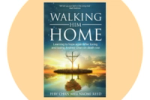Thinking outside the box
Together Magazine
More shops than ever before are taking their business beyond high street premises. Sam Hailes talks to three top retailers to find out what works for them.
Spend time talking to people in the bookselling trade and you’ll soon hear talk of the ‘golden era’. It may be a stretch to claim that Christian retailing has ever enjoyed a booming period, but if forced to pick a time when the trade ever came close to such giddy heights, most would select the 1970s and 80s.

Thinking Outside the Box
Joy and Martin Denny outside The Word in Bedford
Joy Denny from The Word, Bedford comments that during this period shops could almost sit back and wait for customers to talk in the door.The Net Book Agreement (NBA), which held for nearly 100 years (1900-1994) meant that all retailers sold books at prices agreed with the publishers. This arrangement particularly benefited independent shops and helped keep sales up.
Spend time talking to people in the bookselling trade and you’ll soon hear talk of the ‘golden era’. It may be a stretch to claim that Christian retailing has ever enjoyed a booming period, but if forced to pick a time when the trade ever came close to such giddy heights, most would select the 1970s and 80s.
Joy Denny from The Word, Bedford comments that during this period shops could almost sit back and wait for customers to talk in the door.
The Net Book Agreement (NBA), which held for nearly 100 years (1900-1994) meant that all retailers sold books at prices agreed with the publishers. This arrangement particularly benefited independent shops and helped keep sales up.
The reasons why the trade has since taken a turn for the worse have already been debated in the pages of Together. Some blame the rise of the Internet in general and Amazon in particular, others suggest Christians simply aren’t reading as much as they used to, and others lay most of the blame at the feet of the recession and credit crunch. Whatever the reason for the downturn, retailers have been forced to think outside the box (which has often meant thinking outside of their shop) in order to increase sales.
Joy has worked in the trade for over 30 years. She ran Bedford’s local Christian bookshop when it was part of Scripture Union and later Wesley Owen. After she left it went to Living Oasis and finally closed down.
“When we heard that [it had closed] my husband and I felt God calling us to start this shop...When we thought about it, we prayed about it and I researched a lot on the internet, the picture was quite depressing because shops were shutting...but we still felt God was calling us to do this.”
Three years on the shop is still there, but Joy is spending much of her time outside the premises, running bookstalls at events.
“I often get asked to speak at meetings in the period October to December and I try to take those opportunities. I do it as part of the ministry of the shop. I’m not particularly doing it for money but I do think people feel the power of story so I may be talking about God’s calling on our lives and I’ll share about God calling us to open the shop. People can identify with that and think, ‘If I’m buying books from the shop I’m supporting a ministry and not just going on Amazon and buying it for the sake of it.’ Often there have been
really good bookstalls where people have bought quite a lot.”
Last October Joy attended a ladies meeting in a nearby village. There were only 14 older ladies present but when she counted the takings it came to £180 – proof that it can be worthwhile to have a presence at even the smallest of events.
Future opportunities for Joy include putting on a stall where headteachers and clergy who represent Church of England schools will gather for a presentation.
“I’m quite excited about that. I don’t necessarily expect to sell anything but I hope to show them the kind of resources we can get for schools which are really valuable.”
There are similar opportunities for every retailer willing to think differently. But Joy is keen to point out its not all plain sailing. She’s wary of buying in lots of extra stock before big events she’s exhibiting at.
“When people say ‘we’ll sell loads of this’ my experience is they overestimate. If you know the speaker is going to recommend books you will need to get in extra, but my suggestion would be to be quite conservative in your buying. What you can do is have a form so if you run out you can send it to them later and you might offer to do it post free.”
Varying income streams
Nigel Cope manages two bookshops in Preston and Lancaster and, like Joy, he’s seen sales increase by taking the shop to the people. When out and about he often shares his testimony, which he titles “from redundancy to retail”.
“We did one event where we were asked to speak at a lunchtime club. We left at 9.15am, set up the bookstall and gave our testimony to these older folk and said why we are doing the business. Two literally fell asleep while we were doing the talk!
“We had lunch with them and they bought a few things. Got home at 4.30pm. You think, commercially that wasn’t really viable but we were supporting the event so it’s fine. Next thing the church is onto you for their Sunday school material and Alpha stuff. The pastor said ‘you supported our lunchtime club, we’ll support you’.
So you never know!”
Nigel says it’s vital for shops to have a variety of income streams.
“I don’t think you can rely upon people coming across your doorstep. Whether its income streams from people coming in the shop or bookstalls or sale or returns at churches or through your website, its all those. Any way you can increase turnover and then profit. You cannot rely on people coming to your shop any longer. I don’t think you’ll exist if you do that.”
Speaking about setting up bookstalls, Nigel says he always takes around £2000 worth of product, regardless of the size of the event. “50% of you being there is promoting your business.” He’s had ups and downs when it comes to exhibiting. The shop’s worst result was taking £6.30 in 3 hours. But at other events they’ve taken over £1000.

“Some [events] on commercial terms aren’t viable and if you were in another business you’d say ‘we’re not running the event’. But how many people from that event come to you and take stock off you or visit your shop? We don’t always know that.”
Nigel has never had to bid against competitors to run an event bookstall. He’s been fortunate enough to be recommended. But such recommendations haven’t come easily and Nigel is the first to admit when he started running bookstalls his presentation of the stall was poor.
“The way you present yourself is a big thing. We started out with tables and now we have stands. All the tables have cloths on them and it’s the same colour cloth - blue which is the same as our sign. We give out bookmarks with our details on the back. All those things add up to hopefully getting more sales later on. You can’t rely on just putting a bookstall up, you’ve got to be a bit more savvy about it and present yourself properly and market yourself a bit better,” he advises.
The Outlet model
Another experienced bookseller is Pam Brittle from Choice Words in Newton Abbot. Having overseen both the openings and sadly closures of shops in Devon, Pam is aware of the challenges involved in Christian retailing.
“My husband and myself became the owners of Choice Words 20 years ago. In 1998 we opened a second bookshop in Paignton, which is a half an hour drive away from Newton Abbot.
“We decided that running two shops in reasonably close proximity wasn’t viable and had to make the difficult decision of closing the Paignton shop and using Newton Abbot as the hub for all our activities. What we decided to do was explore the idea of expanding book agents into what we described as ‘outlets’.
“We talked to various churches in different areas about the possibility of having something rather more than a bookstall that was open longer than a bookstall would be. Traditionally a church bookstall would be open just when services were on. We have an outlet in Brixham at the Baptistchurch three mornings a week and they carry a range of our stock. We service it every week. They let us know what they need and we take new titles.”
The same outlet model also applies to a Baptist church in Totnes and a Christian conference and holiday centre in Torquay called Brunel Manor. The Brunel staff deal with sales, but Pam and her team provide stock and occasionally deliver orders for those who can’t get into the shop.
The fourth and final outlet is in Paignton where a Baptist church has taken over a shop on the housing estate, which they run as a coffee shop. Pam and her team deliver stock once a week.
These outlets are run in addition to a traditional book agent model where agents collect a box of books either regularly or for special occasions to sell on at a church or event.
Pam has also seen the benefit of running bookstalls for larger events and conferences.
“We do lots of bookstalls for conferences throughout the year. What I try to do is find out who the speakers are, and if they’ve writtenany books. Ask about the theme and if they are going to recommend any books. Then I negotiate with the suppliers and publishers ... a lot of preparation work has to go on beforehand.
“The other thing with a bookstall is you’re able to put most things face out whereas in the shop a lot of it is spine on which is a shame because a lot of work goes on in designing covers.”
When asked how important sales outside of the shop are to the business, Pam responds, “Very important. It used to be the icing on the cake its now really an integral part of our survival.”
My other two interviewees agreed. In order to survive, retailers must promote themselves in the community, seeking to make the most of every available opportunity. Oftentimes the most challenging aspect of Christian retailing is simply getting the products in front of an interested audience.

As regular visitors to big events such as New Wine and Soul Survivor will know, there is still a great hunger for high quality books, CDs, DVDs and gifts (the Marketplace is almost constantly packed, with multiple tills all ringing). Engaging with the local community is key. And if people won’t come to you, perhaps its time to think about going to them?
Latest Blogs

Spiritual Growth
LENT COURSES - How to choose the right one for you
Long overshadowed by the celebrations of Easter Sunday, Lent is being rediscovered as a sacred time of reflection and renewal in its own right and a time of preparation for the joyous seasonal finale.

Featured
Stocking Fillers
Here’s our pick of the top 3 Stocking Fillers this Christmas. You can find even more at our Christmas Store.

News
Where to Watch the New C.S. Lewis Film
Heading to a screen near you soon, The Most Reluctant Convert is a feature-length movie about the life and faith of one of England’s greatest Christian writers and thinkers: C.S. Lewis.

News
Advent Study Guide Review 2021
Go deeper with this year's brilliant Advent Bible Study Guides.

Interview
Author Interview with Feby Chan and Naomi Reed
Feby tells her compelling story in her book Walking Him Home. After wrestling with grief and suffering, she shares how God’s healing and faithfulness is enabling her to step into her new life and ministry.

Featured
3 Reasons People Don’t Read the Bible
We are currently in a strange situation. Bible sales are up, but the number of people reading the Bible is going down. Even stranger, this situation is nothing new. There has always been a difference between the number of people who own a Bible and the number of people who regularly read their Bibles.
